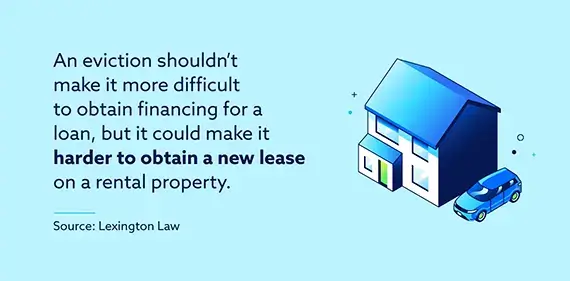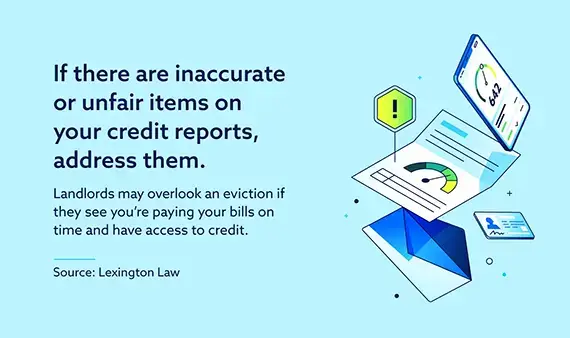
Eviction lawsuits remain on public records for up to seven years. While evictions don’t appear on credit reports, the related unpaid rent sent to collections can negatively impact your credit for the same duration.
The information provided on this website does not, and is not intended to, act as legal, financial or credit advice. See Lexington Law’s editorial disclosure for more information.
Have you been evicted in the past, or are you worried about being evicted in the future? Though evictions typically stay on your public record for up to seven years, they usually won’t show up on your credit reports or directly affect your credit. This guide covers how evictions are reported and how you can handle them.
Please note that the information in this article is general and can vary from state to state. You should consult with a licensed attorney in your area to get specific advice about evictions and related issues.
Table of contents:
- How long does an eviction remain on my public record?
- How to rent with an eviction on your record
- Five strategies for avoiding an eviction
- Steps to take if a civil judgment from an eviction appears on your credit report
- Dealing with an eviction? Contact Lexington Law Firm
- FAQ about evictions
How long does an eviction remain on my public record?
An eviction can stay on your public record for up to seven years, according to Section 1681c, Title 15 of the U.S. Code. That said, how long an eviction stays on your record depends on the circumstances behind it and the state you’re located in, and there may be actions you can take to get it removed sooner.

If the eviction was for a legitimate reason, you can try reaching out to the landlord to work out a private settlement. There’s a possibility you can come to a financial agreement to get them to remove the eviction record. If the eviction was for an illegitimate reason, you can document all records surrounding the event and petition your local court.
How to rent with an eviction on your record
Landlords don’t always turn away potential tenants with evictions, but they’re less likely to offer you a lease if you don’t show you’ve improved your situation. When applying for a lease, it’s important to be honest because landlords will see an attempt to hide your past eviction as a red flag.
Here are a few things you can do before and during an application to make your case for renting after an eviction.
Before submitting a rental application
If you have an eviction on your public record, there are a few things you should do before moving forward with the rental application process. Since a landlord will be wary of renting to someone with an eviction history, you should provide as much information as possible to ease any concerns. Some important tips include:
- Gather a list of references. Get references from your employer, creditors you’ve made on-time payments to and character references who can prove you’re reliable and responsible. Letters of recommendation that speak to your trustworthiness and reliability can make a difference here.
- Fix your credit. If there are inaccurate or unfair items on your credit report, begin a credit dispute to address them. Landlords may overlook an eviction if they see you have a long history of paying your bills on time and have established access to credit.
- Find someone to cosign the lease with you. This can help ease any fears the landlord may have about whether you’ll pay your rent. Keep in mind that a cosigner is also taking a risk because they’re responsible if you miss your rent payments.
Anything you can do to show that you’re reliable and trustworthy will go a long way to convince a landlord that the eviction on your record is truly in the past.
During the application process
When you start actively looking for a new living situation, there are a few things to keep in mind to increase your chances of approval. Here are a few strategies to use when communicating with new landlords:
- Give your side of the story so the new landlord knows why you were evicted. If you’ve settled things with your previous landlord, this could score you some extra points because it shows that you’re taking accountability for what happened.
- Offer to pay a higher security deposit. Most security deposits are one to two month’s rent, but if you offer to pay a higher deposit, your chances of being approved are much higher. It shows you have the means to afford your new lease and offers the landlord a little more financial security.
- Show proof of income and your payment history with lenders. You can provide bank statements, pay stubs and proof you’re making auto loan payments or personal loan payments.
- Make a good first impression. When meeting with a landlord for the first time, treat it like a job interview. Arrive early, look professional and show why you would be a good tenant. If you put your best foot forward, they will be more likely to have a favorable impression of you.

Once you obtain a new lease, you can use it as a stepping stone for the future. Take care of the property and make all your rent payments on time—this should improve your chances of being able to renew the lease, and you can use your new landlord as a future reference if you need to move again. And consider renting the property longer as you rebuild your credit, so you don’t need to go through this process all over again each time you decide to move.
Five strategies for avoiding an eviction
On paper, avoiding evictions is an easy process—simply abide by the terms of the lease and pay rent on time. However, life can easily get in the way. Unexpected layoffs, unreasonable landlords or untimely bills can make an eviction a real possibility.
A few ways to avoid an eviction include:
Improve your financial health
When you’re in a stable financial situation, you’re more likely to pay your rent on time and be prepared for any unexpected expenses. Start small by setting aside money every month in an emergency fund—a good goal is to build up three to six months’ worth of expenses. This will help you stay afloat in case of job loss, unexpected medical bills or other unforeseen circumstances that may impact your income.
Building an emergency fund prepares you for financial emergencies. Knowing that you have a financial cushion can make it easier to manage your day-to-day finances and avoid falling behind on rent in the first place.
Keep open communication with your landlord
If you see yourself having trouble making rent payments in the near future, tell your landlord as soon as possible. Open communication can help you work together to find potential solutions. Early communication demonstrates responsibility and a willingness to uphold your obligations as a tenant, which can foster a positive relationship with your landlord even in challenging circumstances.
Read your lease agreement carefully
The lease is the binding document that determines your expectations as a renter of that property. The problem is that not many people read the document in full. Familiarize yourself with the lease to get ahead of any potential violations and rent payment issues.
Contact eviction prevention
Eviction prevention programs (EPP) exist in every state to help renters who are facing short-term hardships. If you have received an eviction notice, apply to your designated EPP—if you qualify, you may receive short-term financial assistance to help make rent payments.
Consult a lawyer
If you find yourself in a dispute with your landlord or face an unwarranted eviction, it’s a good idea to consult a lawyer. Oftentimes, they will review your lease and hear your side of the story to determine if they can defend your case.
Steps to take if a civil judgment from an eviction appears on your credit report
While evictions can stay on your public record for up to seven years, the three major reporting bureaus voluntarily stopped reporting most civil judgments in 2017 as part of a settlement agreement. As a result, bankruptcy is the only public record that is likely to appear on and impact your credit report.
Obtain a copy of your credit report and verify whether a civil judgment is wrongly on your report and hurting your credit. If you see an inaccurate judgment, you’ll need to contact the credit bureaus to get it removed.
You’re entitled to a free credit report from each of the three major credit reporting agencies each week until further notice—and you can sign up for credit monitoring services to stay up to date on what’s impacting your credit. Many people find errors on their credit reports, and it’s important to get these things removed when they’re identified.
Dealing with an eviction on your credit report?
If you’re concerned about whether or not you can pay your rent, contact your landlord immediately. Evictions require a legal process, and landlords want to avoid the fees and hassle of eviction if possible. If you explain what’s happening, your landlord may offer you ways to make up the past-due rent and avoid the eviction.
If you need assistance with your credit, Lexington Law Firm is here to help. We can help you address inaccurate items on your credit reports. Sign up to learn more.
FAQ about evictions
How does an eviction affect your credit?
Evictions don’t typically show up on credit reports from the three major credit reporting agencies—TransUnion®, Experian® and Equifax®—but your credit could be impacted by the circumstances related to your eviction. If you were evicted because you didn’t pay your rent and have a collection account open, your credit reports will likely have a derogatory mark for the collection item. Should you be evicted for other reasons, such as a violation of the lease rules, your credit shouldn’t be affected.
An eviction shouldn’t make obtaining financing for a loan more difficult, but it could make it harder to obtain a new lease on a rental property. This is because many landlords use the public record database to determine if you’ve been evicted in the past. If a legal case was brought to evict you, that could be accessible via court records indefinitely.
Are rent payments reported to the credit bureaus?
Rent payments aren’t automatically reported to the three major credit reporting agencies. You can, however, use on-time rent payments to boost your credit if you enroll in alternative credit reporting programs. You can talk to your landlord about this, or some paid services allow you to link your bank accounts to record each payment you make toward rent, utilities and cell phone providers. These services sometimes also track your ability to save money wisely by monitoring your contributions to your savings account.
Keep in mind that late or missed payments that are reported can hurt your credit, just like collection accounts. These items will usually show up on your credit reports for up to seven years. This is why it’s important to stay up to date on your rent payments.
Can you remove an eviction from your public record?
You may be wondering how to get an eviction off your record. If you’re evicted for legitimate reasons, you don’t have too many options for getting your eviction removed from the public record sooner than seven years.
Landlords don’t always follow proper legal procedures when evicting tenants, however, so you may be able to dispute the eviction if you can prove you didn’t violate the terms of your lease or the landlord didn’t act reasonably. If you believe the proper legal procedures weren’t followed, you should consult an attorney in your state.
If you pay off an eviction, does it come off your record?
Unfortunately, paying debts from an eviction doesn’t remove the eviction record. Eviction lawsuits create public records, typically visible for up to seven years on tenant screening reports. Paying the debt primarily prevents further credit damage from collections and may improve your standing with future landlords.
How long after an eviction can I rent again?
The time it takes to rent after an eviction varies. Landlords have different policies, and eviction records can last up to seven years on tenant screening reports. Your rental history, local market and proactive steps like settling debts and being transparent will impact your ability to rent.
Do evictions go away after seven years?
Eviction records’ visibility can vary. While tenant screening reports often show evictions for up to seven years, the underlying court records may remain accessible for longer, depending on local laws. So, while eviction records may drop from easily accessible reports after seven years, they may not entirely disappear from all sources.
Can you expunge an eviction?
Expunging an eviction record is possible in some jurisdictions but is not a universal option. State and local laws dictate whether expungement is allowed and outline the specific circumstances under which an eviction record can be sealed or erased.
Seek out a legal professional who is well-versed in the local regulations that apply to your area to determine if this is an option. They can provide guidance on the necessary steps to take and advocate on your behalf in court if needed.
Will an eviction show up on a background check?
Yes, evictions can show up on background checks, particularly those that include tenant screening. These checks typically access public and civil court records, where eviction lawsuits are recorded. Even if your background check is not strictly related to housing, an eviction will likely show up on that background check.
Note: Articles have only been reviewed by the indicated attorney, not written by them. The information provided on this website does not, and is not intended to, act as legal, financial or credit advice; instead, it is for general informational purposes only. Use of, and access to, this website or any of the links or resources contained within the site do not create an attorney-client or fiduciary relationship between the reader, user, or browser and website owner, authors, reviewers, contributors, contributing firms, or their respective agents or employers.
